LATEST NEWS


The biggest economic debate is between Keynesians (who want more government spending and lower interest rates in order to fuel demand) and supply-side “austerics” (who want lower taxes on the wealthy and on corporations to boost incentives to hire and invest, and who see government deficits crowding out private investment).
But both approaches have problems.
George W. Bush tried supply-side tax cuts but nothing trickled down. Jobs and wages declined. And austerity economics has been a disaster for Europe.
Unfortunately the U.S. is now adopting supply-side austerics by making the Bush tax cuts permanent for 98 percent of taxpayers, hiking Social Security taxes back up, and implementing the sequester.
I’m on the Keynesian side. Yet the biggest weakness of modern Keynesian economics is it doesn’t have a clear answer for how much spending is necessary in an economy, like ours, in which wages keep dropping and government debt keeps growing.
» Read more about: America’s Worst Recovery on Record — And Why »


There’s a growing impatience amongst those committed to pushing L.A. to meet its ambitious Zero Waste goals. For years, the Don’t Waste LA Coalition, which includes Sierra Club, Coalition for Clean Air, Sustain L.A. and the Natural Resources Defense Council (NRDC), has been pushing to address the large portion of trash that goes to landfills from businesses and large apartment buildings. Addressing this sector will be a game changer for L.A. And after an arduous process with a multitude of hearings, workshops, and meetings, we’re ready to move forward.
Right now, the open permit system that handles waste from businesses and large apartment buildings has failed us. Its bottom barrel competition has left us with a measly 19 percent diversion rate for businesses in L.A. And, despite the best effort from business lobbyists to defend this type of program, we’ve seen a lack of effort to live up to the environmental stewardship demanded in a city like Los Angeles.
» Read more about: L.A.’s Slow Push to Meet Its Zero Waste Target »
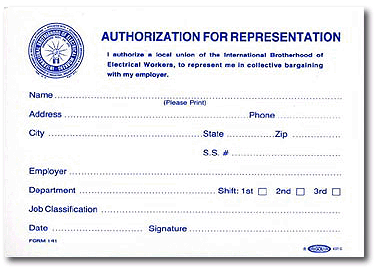

My cousin and I have stayed in touch over the years despite the distance — he grew up in a Texas border town and has lived his adult life in Phoenix. Both he and his wife have held well-paid positions in the health field. Like most families, when we visit, we avoid subjects in-laws shouldn’t talk about, including politics and religion. But this time, he brought up the topic of unions, so over the next several days we talked intermittently about unions and why low wage workers need them.
On our final evening together, we sat across from each other in one of those expensive Santa Monica restaurants named after its chef. I said, “So here is the bottom line for me: People who work all day should be able to provide shelter and food for their families, and they ought to have health care.”
“I don’t know that I disagree with that,” he replied.
» Read more about: Building a Better Life: Bottom Lines and Top Priorities »


College student leaders from across California reacted to the President’s budget on April 10, calling on Congress to extend the low interest rate and give students time to weigh in on more comprehensive reform. Last year, Congress temporarily extended the low rate for one year, which saved close to eight million students $1,000 per loan borrowed. California Public Interest Research Group (CALPIRG) leaders, working in coalition with many student advocacy groups and education groups led the charge to make sure that Congress didn’t double our rates last year, with the deadline looming once again, we are calling on these same decision makers to step up again this year.
The President released a budget that included a proposal for preventing the student loan interest rate from doubling this July 1.
“Unfortunately, the President’s proposal lowers interest rates now by charging more from student borrowers down the road,” said Roshni Ashok,
» Read more about: White House Budget Leaves Students in the Lurch »
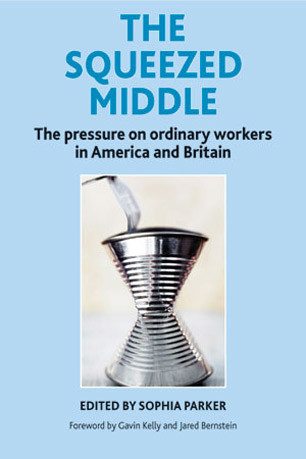
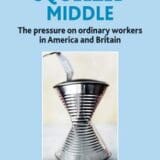
The Squeezed Middle: The Pressure on Ordinary Workers in America and Britain, a short book edited by Sophia Parker, brings together 16 scholars and activists to diagnose America’s malaise. (Policy Press, 2013.)
You probably don’t need a book to tell you that the United States has fallen into the economic abyss and the United Kingdom is teetering on the edge. Wages have been flat for 40 years; welfare as we knew it is gone and the political system has been corrupted by corporations and greed.
If you’re British, you might think that the United Kingdom isn’t teetering, but has already firmly landed at rock bottom. If that’s what you think, then think again. Things are much more savage on the Tea Party side of the Atlantic Ocean. Mother country, beware.
Inequality has risen dramatically in both the United States and the United Kingdom, but the United Kingdom maintains some vestiges of civilization,
Here’s Public Works‘ singalong video of Irving Berlin’s 1942 song, “I Paid My Taxes Today,” performed by Gene Autry. Lyrics below:
I said to my Uncle Sam
“Old Man Taxes, here I am”
And he was glad to see me.
Mister Small Fry, yes, indeed.
Lower brackets, that’s my speed.
But he was glad to see me.
I paid my income tax today.
I never felt so proud before,
To be right there with the millions more
Who paid their income tax today.
I’m squared up with the USA
See those bombers in the sky,
Rockefeller helped to build ‘em.
So did I.
I PAID MY INCOME TAX TODAY
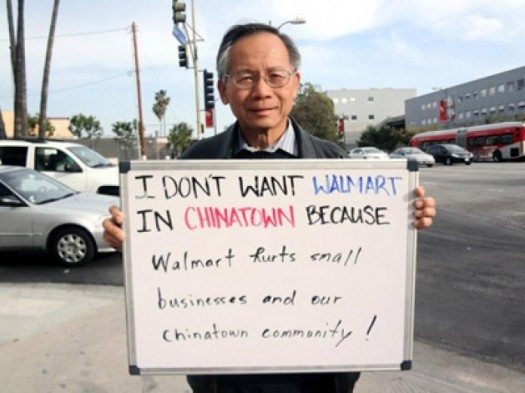

Walmart might have viewed their plans to open in an existing building in Los Angeles Chinatown as a bullet-proof strategy. The retail giant would open its new store in the Grand Plaza, an existing building, that unlike new construction, would allow the retailer to proceed without a public hearing.
As the company worked on its renovation plans, which started last year, Aiha Nguyen at the Los Angeles Alliance for a New Economy (LAANE) and community members dug through reams of city documents.
They realized the retailer and city officials needed something central to the democratic process — a public hearing for neighborhood residents to provide feedback about the store in the Grand Plaza building.
The Grand Plaza had received about $7 million in subsidies years ago, Nguyen said, adding that a hearing and environmental requirements from a city-approved Chinatown Redevelopment Plan still apply to any new tenant.
That requirement is serving as the basis for the April 4 lawsuit that could block Walmart from opening in 30,000 square feet of space in the downtown area.
» Read more about: Community Fights Walmart’s Backdoor Chinatown Strategy »


(As the May 21 mayoral runoff election approaches, Frying Pan News is asking voters what they believe the next mayor’s priorities should be — as well as what he or she should avoid doing once in office. This week reporter Marc Haefele interviews South Los Angeles residents at the Baldwin Hills Crenshaw Plaza, the sprawling retail complex located at Martin Luther King Jr. and Crenshaw boulevards.)
Carmen Navarro:
I would hope the new mayor would at least do better than the current one. Of course, they are all politicians aren’t they — what can you expect? Sometimes the most you can do is to hope that it just doesn’t get worse when someone new is elected.
But here’s what I hope the new mayor would do — do a lot more to help the poor folks. Help them to get more opportunities. The economy right now is still simply horrible for poor folks.
» Read more about: L.A. Mayor’s Race: The View from Crenshaw »


Was Occupy Wall Street just a dream? The fall of 2011 was one of the most exciting and optimistic times of my life as a progressive. Seeing thousands of young people all over the country flock to their local occupations was truly amazing and historic. I felt that we were in the middle of a cultural awakening and that a huge radical change was just on the brink.
The other weekend I went to New York City to see where it all began up close and in person. I walked to Wall Street to find Zuccotti Park and literally walked right past it. Quite naively I expected a huge space with progressive activists still meeting and planning the revolution, but found no one. In fact, Zuccotti Park is a tiny little plaza where tourists rest after visiting Ground Zero and taking pictures of the Wall Street bull sculpture. On the subway back to my friend’s house,
» Read more about: Zuccotti Park Blues: Occupy Wall Street Reconsidered »


(Orlando Ayala has been a truck driver at the ports of L.A. and Long Beach for 10 years. He recently sat down and talked to LAANE Deputy Director Patricia Castellanos about the successful effort to improve conditions at Toll, the global logistics company where he works. Yesterday marked the one-year anniversary of the election in which Toll workers chose to be represented by a union – the first such election in three decades.)
I was recently accused of thinking with my heart and not with my head, of letting my passions and outrage get the best of me and guide my actions. At the time, this wasn’t a compliment. But these traits have served me well. If not for them, I may not have crossed multiple borders seeking a better life in the U.S., or been driven to action by the outrage I felt at seeing injustices suffered by the thousands of port truck drivers at the largest port in the country.
» Read more about: How Organizing for a Union Changed My Life »
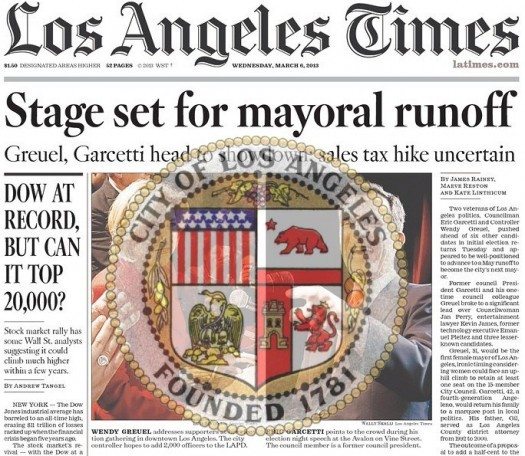
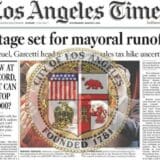
(Raphael “Raphe” Sonenshein is executive director of the Edmund G. “Pat” Brown Institute of Public Affairs and has headed charter-reform and neighborhood council review commissions. A California State University political science professor, Sonenshein is also an author whose books have analyzed racial and reform politics. He spoke to Frying Pan News about what he believes are the biggest tasks facing L.A.’s next mayor – as well as telling reporter Marc Haefele what candidates Eric Garcetti and Wendy Greuel should avoid during the campaign before the May 21 runoff election.)
The Biggest Job
The next mayor has to reinvent his office as an office of strength, because just being elected doesn’t hand you that. Once you are in you will be dealing with very powerful forces of the community and very powerful forces at City Hall —
» Read more about: Raphe Sonenshein’s Advice to Garcetti and Greuel »


The Los Angeles Department of Water and Power (LADWP) recently released its “Energy Efficiency Portfolio Business Plan” for fiscal years 2012-2014. For the past few years, LADWP has been talking the talk about doing more energy efficiency, and (importantly) using efficiency as its top priority resource for getting out of coal power. This plan shows that LADWP is walking the walk!
Particularly impressive aspects of the plan:
Overview of the plan:
» Read more about: Energy Efficiency: Walking the Walk at LADWP »
The White House and prominent Democrats are talking about reducing future Social Security payments by using a formula for adjusting for inflation that’s stingier than the current one. It’s called the “Chained CPI.” I did this video so you can understand it — and understand why it’s so wrongheaded.
Even Social Security’s current inflation adjustment understates the true impact of inflation on the elderly. That’s because they spend 20 to 40 percent of their incomes on health care, and health-care costs have been rising faster than inflation. So why adopt a new inflation adjustment that’s even stingier than the current one?
Social Security benefits are already meager for most recipients. The median income of Americans over 65 is less than $20,000 a year. Nearly 70 percent of them depend on Social Security for more than half of this. The average Social Security benefit is less than $15,000 a year.
Besides,
» Read more about: Robert Reich: Don’t “Chain” Social Security »


I have been humming one of my favorite Elvis Costello songs from the moment I heard the news of Margaret Thatcher’s death Monday morning. The chorus never fails to move me:
“When they finally put you in the ground,
I’ll stand there laughing, and tramp the dirt down.”
A friend forwarded me some other excellent Thatcher songs, and I spent last night on a truly enjoyable trip down Memory Lane.
The songs and videos gathered include Costello’s, along with Billy Bragg’s, and the Specials’ “Ghost Town” – which was the soundtrack to a summer spent in London when I was 14 — and more hardcore offerings. Perhaps Thatcher’s one positive legacy is the inspiration she provided to punk rock. I remember the kind of ecstatic anger I felt listening to some of those bands – and Thatcher was an excellent focus for that anger.


The national discussion on immigration reform is heating up now that the “Gang of Eight” plans to release its detailed version of the Senate bill. As with similar efforts in past years to pass comprehensive immigration reform through Congress, the draft legislation to start the process will undergo massive changes as legislators debate the issue, especially as it moves into the House of Representatives. Yet one point has received considerably less attention in the national debate, but will probably make the most difference to most immigrants and the economy– the enforcement of workplace rights.
I have been involved in the debate on immigration reform now for more than 25 years, since the passage of the Immigration Reform and Control Act of 1986 (IRCA). I have seen the demographics of the country shift and have witnessed this debate in many stages and from many perspectives.
One thing we learned from the Immigration Reform Control Act (IRCA) of 1986 is that it fell dramatically short when it came to improving the working conditions of the estimated three million immigrants who gained legal status.
» Read more about: Immigration Reform Alone Won’t End Workplace Wrongs »


It was announced over the weekend the bipartisan Senate “Gang of Eight” came to an agreement in principle on a major aspect of creating a commonsense immigration process that benefits all workers.
This agreement includes a new kind of worker visa program called the W-Visa, which will work for everyone, not just employers.
Here are five things you need to know about this new employer-based visa:
» Read more about: Five Important Points of the Immigration Agreement »
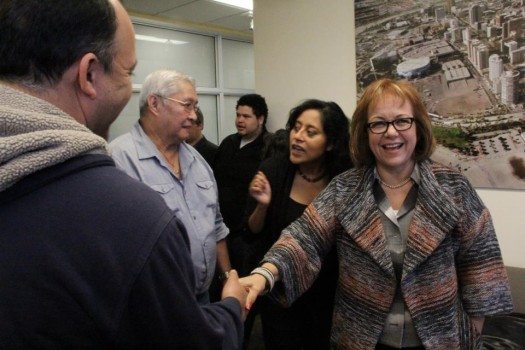

Hyatt hotels in Long Beach, UNITE HERE Local 11 and Long Beach City Councilwoman, Dr. Suja Lowenthal, announced Monday that associates at the city’s Hyatt Regency and Hyatt The Pike have elected to be represented by UNITE HERE Local 11.
All Hyatt associates who will be represented by UNITE HERE Local 11 in Long Beach were eligible to vote in the election, which was supervised by an independent election judge. The judge verified the results last week, noting that a majority of Hyatt associates who were eligible to vote chose to have UNITE HERE represent them. Hyatt associates were notified last week of the election results.
“We’ve always maintained strong relations with our associates and unions representing Hyatt associates in other locations, and we’ve always believed Hyatt associates should have the right to choose union representation in an election,” said Stephen D’Agostino, General Manager of Hyatt Regency Long Beach. “We look forward to working with UNITE HERE to reach a contract that will continue to support our associates and maintain our high workplace standards.”
In November 2012,


With a trumpet blast from the sources of conventional wisdom, the Keystone XL pipeline charged through the news sources last month. When the State Department released its positive environmental report that is seen as clearing the way for a pipe full of Canadian oil slurry to run through the heartland of America to the refineries of Houston, the pundits lined up to salute. They said the XL would add to American oil independence. They said it would bring jobs. They said it would never cause any of those silly problems the environmentalists were bothered about.
But as usual, the CW is wrong on all counts. The proposed pipeline will bring crude from the tar sands in Alberta province, down across the fragile Midwestern Ogallala aquifer to south Texas where it would be refined by the oil industrial complex, then shipped out to markets in Africa and South America. That’s right — the oil transshipment is not intended to produce for the American market,
» Read more about: Keystone Pipeline: Canadian Profits, American Woes »


The question we must ask today, as we remember the Works Progress Administration is: Why isn’t there the political will to take dramatic steps to address today’s jobs emergency?
Let’s start with the obvious; there was a far greater share of Americans unemployed in the Great Depression. In 1934, unemployment peaked at 24.9 percent. One-out-of-four people officially out of work is much more of a crisis than one-out-of ten (9.6 percent), the peak in the current recession in 2010. The impact is even greater than two-and-a-half times, as such a huge drop in consumer spending means that marginal businesses able to survive 10 percent unemployment rates were swept away in the Depression. And during the Depression – much more than now – it was impossible not to know people whose lives had been devastated.
The other obvious difference is that we have cushioned the impact on the unemployed through the establishment of New Deal programs,
» Read more about: The WPA Turns 78 — Where’s Our Version Today? »


“I remember my Mom’s heartbreak when she could not afford to give my younger brother the treatment he needed when we learned he had a hip disease,” the man said. “It was my Mom – the wife of a WWII veteran — who taught me something I still believe today: This country is the greatest in the world. America’s greatness is largely because of how we value the weakest among us. Quality healthcare services must be accessible and affordable for all – not just those in certain ZIP codes or tax brackets.”
That’s music to the ears of progressives, maybe even Top-40ish in its soothing, harmonious familiarity. The dissonant note is who actually spoke the words: Rick Scott, the Republican governor of Florida, who swept into office on an uncompromising anti-Obama, stop-health-care-reform platform, and was one of the first to sign on to lawsuits challenging the constitutionality of the Affordable Care Act (ACA).
» Read more about: Medicaid: Conservatives Get Flexible (Sort Of) »